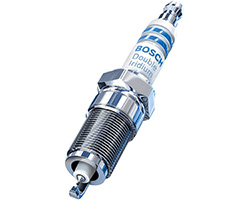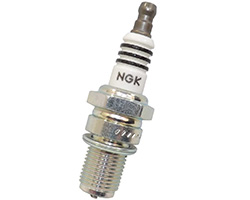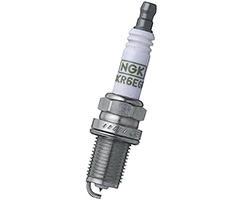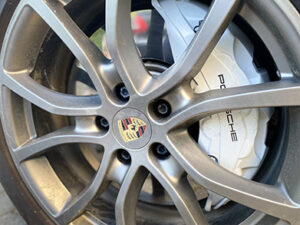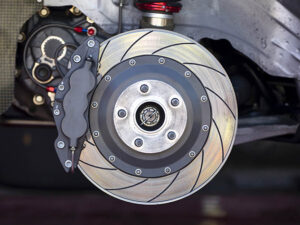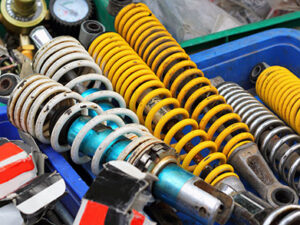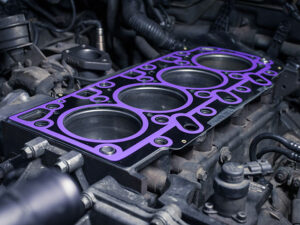Home \ Shop \ Engine & Efficiency \ Spark Plugs
The Best Spark Plugs in 2025: Review and Buyer’s Guide
Healthy Spark Plugs, which meets manufacturer requirements, will positively impacts your car's mileage and emission efficiency, as well as on overall engine performance
- 1. Review Of The Best Spark Plugs
- 2. BOSCH 9652 Double Iridium Spark Plug
- 3. NGK 6619 LFR6AIX-11 Iridium Spark Plug
- 4. NGK 7090 BKR5EGP G-Power Spark Plug
- 5. DENSO 4504 PK20TT Platinum TT Spark Plug
- 6. BOSCH 4417 Platinum+4 FGR7DQP Spark Plug
- 7. CHAMPION RE14MCC4 (570) Copper+ Spark Plug
- 8. Why Do You Need a Good Spark Plugs?
- 9. Healthy Spark Plug Benefits
- 10. Signs of Old Spark Plugs
- 11. Types of Spark Plugs
- 12. Key Features of Spark Plugs
Changing spark plugs is perhaps one of the more uncommon do-it-yourself maintenance tasks for your car. Their primary function is to ignite the mixture of air and fuel, doing so via a transmission of electrical energy. Thus, proper maintenance is one of many ways that you can improve your vehicle’s fuel efficiency and overall performance.
Changing spark plugs might be new territory for many drivers, and it’s not easy to know what to look for in a replacement. So, to make it easier, we’ve compiled a short list of the best spark plugs on the market, as well as some tips and general knowledge.
Review Of The Best Spark Plugs
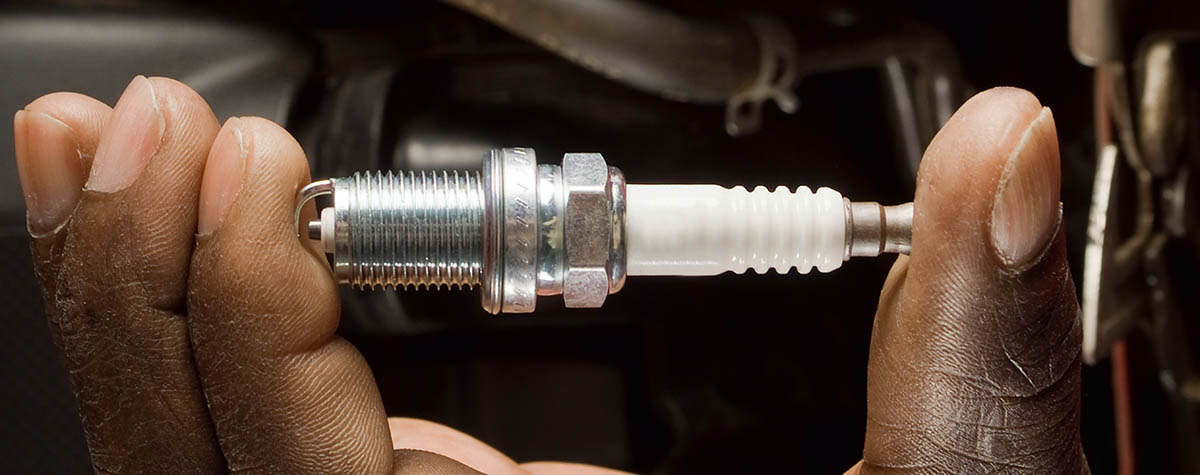
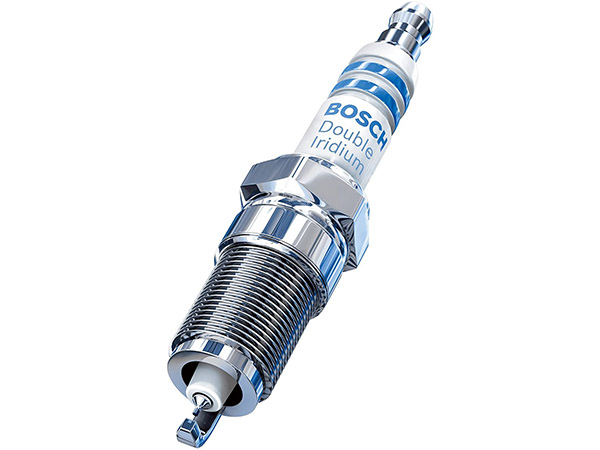
PROS
- Long service life (up to 4X)
- 7 Year performance satisfaction guarantee
- Tailored for efficiency
- Pre-gapped and optimal fit
CONS
- No significant downsides
Our top pick when considering quality and price is the Bosch Automotive 9652. It has a nice balance of specialized attention to detail and longevity, making it a great long-term choice for your car.
Reliable and Durable: Up to 4X longer service life & 7 year of great performance!
The construction itself is quite intricate, offering not only protection from things like corrosion, but also easy installation and handling overall. The way this spark plug is designed, it requires less voltage than normal due to the fine wiring. In addition, the copper core ensures efficient heat transfer, contributing to its longer service life. In fact, Bosch is so confident in their product’s lifetime that they guarantee 7-year performance satisfaction.
This model is one of the most finely pre-gapped spark plugs out there, and its affordable price certainly add to its appeal to buyers. All in all, these plugs are easy to install, offer great long-term performance, and are quite well-designed in all aspects. The 9652 in particular is fit for Acura, Infiniti, Mercedes-Benz, and Mitsubishi cars, but there are a multitude of sister products fit for other brands. They might vary in price or in the minor details, but generally, they’re all top performers. One thing to note, however, is that you should absolutely make sure that you’re getting authentic, German-made spark plugs if you’re looking to buy a Bosch Automotive product; there are some unauthorized sellers online.
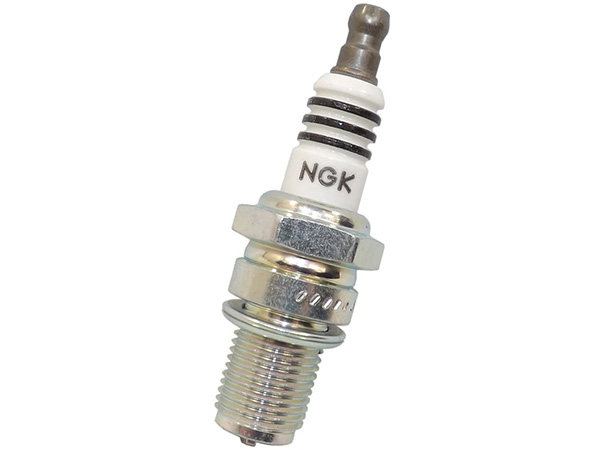
PROS
- Great throttle response
- Great ignitability
- Peak performance
- High durability / Long service life
- Pre-gapped
CONS
- No significant downsides
For something a little more top-shelf, there’s the NGK options. As a reputable manufacturer of spark plugs, it’s no surprise that one of their models finds itself on this list. When it comes to performance and improved response, there’s few that match it.
Great Ignition over 80000 miles: for car performance enthusiasts
There are multiple buyers noting the noticeable improvement in ignition response and speed upon replacing their original plugs. In fact, many have even gone to praise these plugs for bringing back their engine’s “purr” upon starting. Overall, in terms of bringing an instant impact to your car’s sound, feel, and performance, the NGK is certainly top of the line.
Drivers that are inexperienced with spark plug replacements might find installation a bit tricky, however. The pre-gapping on these plugs can often be a little off, and could need some adjustment to prevent coil issues. Long-term use could also shift the gaps over time – one buyer noticed a fairly significant discrepancy after putting on 80,000 miles, but performance seemed unaffected. So, if you’re looking for some very high-quality spark plugs that will make an instant impact on your start speed and sound, these are a fantastic choice; be sure to familiarize yourself with this model and your car’s requirements beforehand, though.
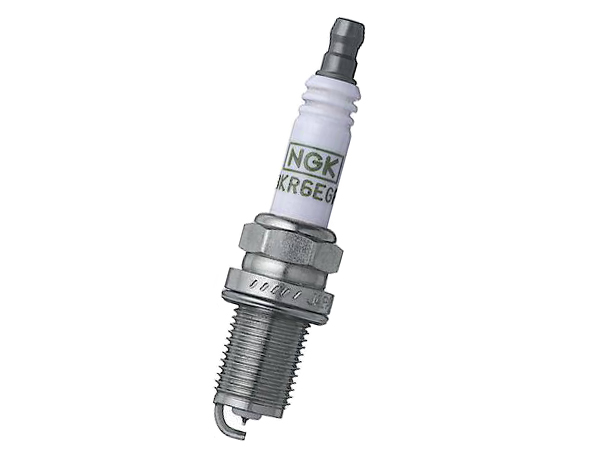
PROS
- Good performance and ignition
- Decent service life
- Built to last
- Good corrosion withstand
CONS
- Gap needs to be set
It’s no surprise that this NGK 4-pack boasts an Amazon’s Choice label – for effectively the price of 2 high-quality plugs, you can get double that. Affordability notwithstanding, how do these plugs fare in terms of performance?
Best Value for Money: built to last
If this product came as a pack of two for the same price, it would still be a solid purchase. These platinum alloy spark plugs are extremely easy to install, and are quite durable to boot. The laser-welded platinum tip reduces the voltage you need to start your engine, while the overall construction of the ground and center electrode ensures minimal shifting of the gap over time.
There is very little to criticize about these plugs; everything from durability to efficiency is covered by the overall design. The gaps are built to withstand corrosion thanks to the prevalence of platinum in these plugs. Many users remarked about their ignition vastly improving upon changing their plugs, both in sound and speed. One downside to these plugs, though, is that you (or a mechanic) would have to set the gaps prior to installation. Regardless, anyone looking to buy high-quality plugs in bulk rather than sticking with high-mileage choices for longer intervals should put this NGK 4-pack on their list.
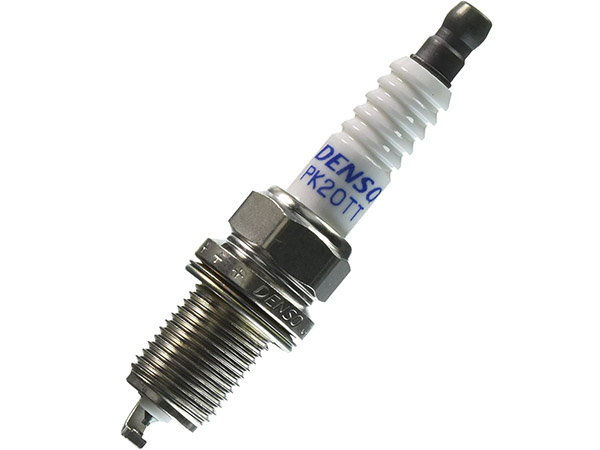
PROS
- Made with Platinum and Titanium
- Improves fuel economy
- Good throttle response
- Very affordable
CONS
- No significant downsides
The great thing about the Denso PK20TT is the nice balance of quality and affordability. For a spark plug with a platinum center electrode, it is very reasonably priced, and while it concedes to the above competition in performance, it’s more than worth the price.
Decent Overall: quality made product with good characteristics
A unique aspect of this model is the twin-tip technology, as the name suggests. In terms of efficiency, the purified alumina powder coating offers a boost in strength and conductivity. This also adds some much-needed stress resistance and, combined with the solid construction, is great for smooth ignition and fuel efficiency.
It’s pretty much a middle-of-the-road choice in many respects. Its value for money and longevity are decent, but not quite top-shelf. A few buyers found that these plugs were incompatible with their car, so it’s imperative that you double-check whether these plugs will work for you. However, those whose cars it fit perfectly found great results and enjoyed improved starts and an easy installation. Depending on your requirements, though, you might need to adjust the gaps.
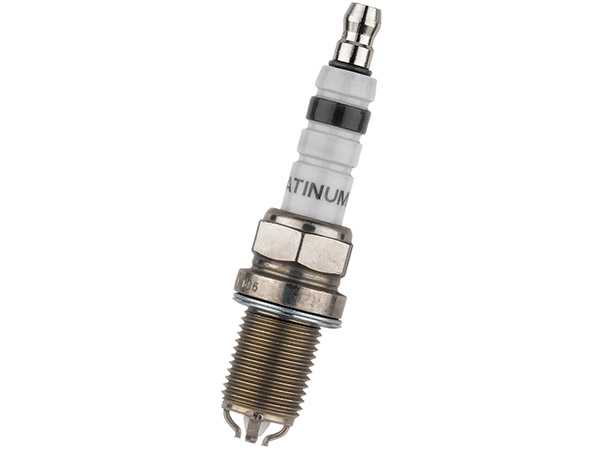
PROS
- Solid platinum/yttrium design
- Improves ignition (speed & sound) and idle driving
- Design reduces wear
- Long-term peak performance
CONS
- No significant downsides
This model comes fairly close to competing for the top spots, especially when it comes to longevity and installation. It’s a bit on the pricey side, but the durability and performance it offers more than makes up for that.
Good Choice: Solid design for top performance
Replacing your spark plugs can be the definition of instant results with very little effort, and these are no different in that regard. The performance that the Bosch 4417 offers, when coupled with their long-term reliability, makes these plugs nothing short of a great investment. Buyers generally echo the sentiment that replacing their old plugs with these came with noticeable improvements, from smoother idle driving to a satisfying ignition.
The design is quite novel as well, boasting four yttrium-enhanced ground electrodes for enhanced air/fuel access. The chosen materials also reduce gap wear and long-term oxidation, ensuring optimal performance for a longer period of time. The gap itself is also factory-set and is built in a way that it requires no adjustment at any point, which makes it one of the more user-friendly options on the market. All in all, this choice is quite the contender due to its performance and durable design.
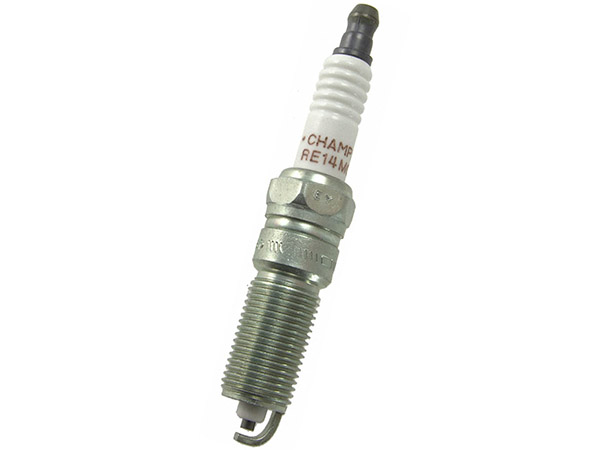
PROS
- Anti-corrosion coating
- Very affordable
- Great performance
CONS
- Gaps might need adjustment
- Not a long-term option
When you combine affordability and solid performance, you get these Champion spark plugs. Often as low as ¼ the price of competing offers, these are a surprisingly strong performer among replacement plugs.
Main of What You Need: good performance for whom, who changes spark plugs frequently
There is nothing overtly special about these spark plugs in terms of the materials used or the design. It’s essentially a template for a basic but solid plug. The center electrode has a copper core (like the Bosch), boosting efficiency in terms of heat flow. The outer layer is reinforced with a (patented) ultraseal coating, protecting the plug from corrosion over time.
All in all, these plugs will do the job but (as the price suggests) not to the extent of the more fleshed-out brands. They might require more frequent replacements due to the limited innate protection and durability from the materials or design. However, for anyone on a budget in need of a replacement, these plugs will do the job, though you should be prepared to put in a bit more work in installation and maintenance. The gaps, namely, might need to be adjusted before installation, and could shift over time.
Why Do You Need a Good Spark Plugs?
Anyone who has replaced some very old spark plugs can tell you: new plugs make a world of difference for smooth ignition and driving. Because spark plugs ignite the fuel/air mixture to start your car, old plugs in need of a replacement can affect your fuel efficiency, idle driving, and start-up sound and speed. Replacing them can make your engine sound brand new, and help your car perform to its fullest potential.
Like changing your motor oil and/or oil filters, spark plugs have a direct impact on the health of your engine. After all, they are the reason your car starts at all. As they get used more and more, the electrical energy they generate and transfer can have several lasting effects on the plugs themselves. One such example is build-up; whether it’s air or debris, the deposits that form on your plugs over time can slow down your car’s ignition. In fact, one of the primary reasons for pre-ignition is carbon deposits on the spark plugs.
Long-term use can generally wear down your spark plugs; if they were designed for 50,000 miles and they’re pushed for 80,000, chances are the plugs won’t be close to their peak performance anymore. While it’s not very easy to notice the gradual decline of your spark plugs’ effectiveness, doing regular maintenance and replacement can keep these declines to a minimum.
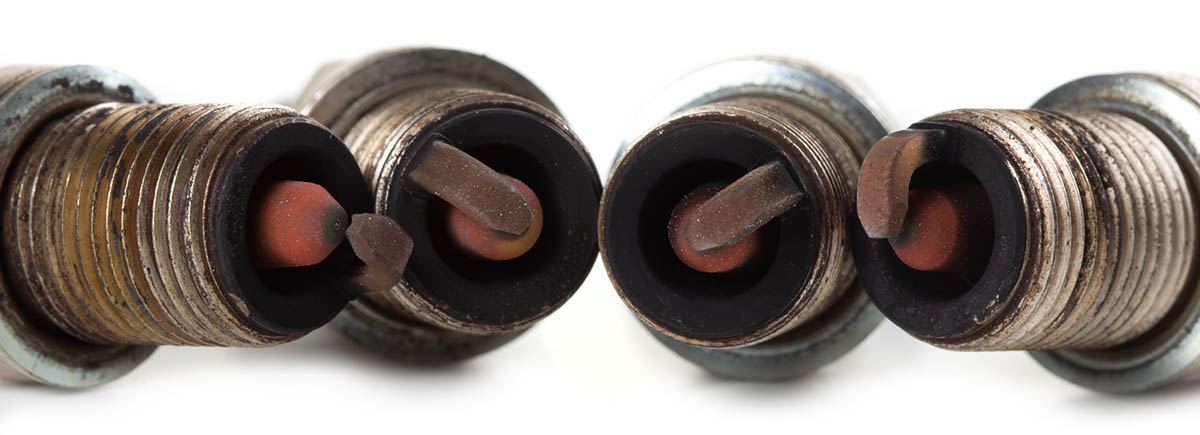
Healthy Spark Plug Benefits
A new, healthy, and effective spark plug will benefit your car in several ways. The first thing you’ll notice after replacing your old ones is how quickly your engine starts up and how it sounds. This is one of the main reasons changing spark plugs is described as instant gratification; drivers often describe it as a gentle purr. Similarly, the engine likely won’t take nearly as long to start, cutting your ignition time and waste. And, again, your fuel efficiency (especially if you’ve replaced very old plugs) will quite noticeably rise, as fresh plugs help your engine work at 100% again.
Signs of Old Spark Plugs
For anyone who experiences oddities while driving – jerking, twitching, or start-stop behavior, for example – might need to look at their spark plugs as the primary reason. Oftentimes, old plugs will have inefficiencies like excess heat buildup that limit their capabilities and result in frustrating driving habits.
See also: Best Automotive Multimeters and Best OBD2 Scan Tools for help in your car’s diagnosis.
Other than that, you’ll know it’s time to replace your plugs for a number of reasons. First of all, if it’s been over a year since you changed your plugs (or, if you’ve never replaced them, a year since you got your car), you should definitely at least take a look. Depending on the quality of the plugs, a year could do a lot to their performance. If you’re noticing a discrepancy in metrics like fuel consumption and acceleration, faulty plugs could play a hand. More noticeably, if you’re experiencing misfires or have trouble starting your car, your best bet again is to replace your plugs.
Types of Spark Plugs
There are many different types of spark plugs in our list alone, and it’s important to know the main differences between them. Copper, platinum, and iridium are the more common metals used in plugs, but there is a great deal of variance in materials and welding processes.
Copper spark plugs. Quite often, basic and affordable spark plugs are made from solid copper. Copper plugs were far more common in the past, where vehicles could afford some of the inefficiencies that come with using copper. Commonly, a copper plug is supported by a nickel alloy central electrode, a fairly malleable and not very long-lasting choice. Thus, there are two main downsides to this: the plug has to be thicker and thus requires more voltage, and the plug won’t last very long compared to other choices.
Copper-based spark plugs aren’t as efficient as those made of, say, platinum, but are quite affordable and work just fine for older cars. Some copper plugs could even offer some great performance, but would need more frequent replacement.
Platinum spark plugs. Platinum is sort of like an upgraded version of copper for spark plugs; it has a similar structure, with the key difference being the presence of platinum in the central electrode. This helps platinum plugs generate more heat and maintain performance long-term, while limiting the collection of debris and deposits. If your car has an electronic ignition system, platinum plugs will both perform better and last longer than copper.
Double Platinum spark plugs. Double platinum spark plugs, much like platinum, are very reliable and can last you a very long time. The key difference between the two, however, is that a double platinum plug has a platinum disc on the center and side electrode. This gives them an edge in performance for cars with a waste spark ignition system, as they effectively ignite twice. One benefit of such a system is the resistance to any environmental effects such as rain. Otherwise, platinum and double platinum plugs work about the same, and get much hotter than copper.
Iridium spark plugs. Finally, iridium spark plugs are typically the ones that stand the test of time thanks to their durability. Of course, this makes them pricier, but it’s merely a tradeoff for boosted longevity. One key advantage of iridium plugs, other than their sturdiness compared to platinum, is the thinner central electrodes; this means that the system requires less voltage to generate a current, and is thus more efficient. Really, the only downside of iridium plugs is their price, but again, they last longer anyway. If your car manufacturer recommends iridium plugs, don’t switch to platinum or copper, as your engine might not run at peak performance.
Key Features of Spark Plugs
There are several aspects of plugs that vary from model to model. Namely, you have a variety of choices in materials, type of gap, and the gap size itself. A lot of these choices are pretty straightforward based on your car model, and it’s important to identify the features that would be best for you as well.
- Material. We’ve already touched on the main spark plug materials above, so let’s quickly summarize. Copper plugs are cheaper and almost always come as a single, high-voltage electrode. Thus, they’re best used in standard older models. Single-electrode platinum plugs are better than copper for newer cars, but aren’t as durable or energy-efficient as iridium ones. Double-electrode plugs, whether platinum or iridium, are more suitable for waste spark DIS (distributorless ignition systems).
- Longevity. Some spark plugs have a specific change interval outlined, which depends on a number of factors, importantly material. If you’re used to doing frequent maintenance (say, every 20,000 miles), a spark plug with a shorter replacement interval wouldn’t be a bad idea, as long as it performs to your standards. Long-term options have higher intervals, and thus maintain their performance for longer stretches of use, up to over 100,000 miles.
- Heat Range. There is a stark difference in how spark plugs with different heat ranges work long-term. Plugs with a higher heat rating (i.e. lower heat levels) are more prone to developing deposits and debris, which leads to inefficiencies in ignition. On the other hand, a lower heat rating (i.e. higher heat levels) corresponds to a higher chance of developing pre-ignition, which is a contributing factor to plug erosion. It’s important to make sure your plugs aren’t too hot or too cold, as both sides of the spectrum have their own potential issues.
- Electrode Gap. The electrode gap corresponds to the magnitude of the spark, and every vehicle has its own optimal magnitude for fuel combustion. If your plug’s gap doesn’t line up with your engine’s requirements, it might lead to decreased fuel efficiency due to the inability to completely combust the air/fuel mixture. Thus, even if you buy a pre-gapped plug, it’s important to make sure it has the correct gap size for your vehicle for optimal performance.
The gap can come in a few different styles as well, but the most common (and simplest) style includes a single arched arm around the electrode tip. As styles aim to ensure minimal gap shifts or issues, they get slightly more complex. In the end, the style isn’t as important as ensuring that the gap stays at the correct size for the entirety of its lifetime.

Most of your buying decisions can be made with a quick look at your owner’s manual, or simply by being familiar with your car’s spark plug requirements. For example, if your car manufacturer recommends an iridium plug, it’s not the best idea to replace it with a different kind, as it might not run as efficiently. Similarly, you should already know the gap size you need before you go out on your search, as every vehicle has an optimal spark magnitude and thus, gap size.
Someone with a waste spark DIS would be a bit more constrained in their search, as a double platinum or double iridium choice would be their best option. However, if you don’t have these kinds of constraints, your choice is very much dependent on what you’re looking for.
Iridium plugs are generally the most durable and long-lasting, but require a bit of an investment. Then again, that pays itself off if you can take it the extra mile without any performance issues. The NGK 6619 on our list is a prime example of how far a solid iridium plug can take you, improving your ignition massively along the way.
For someone on a budget, copper plugs aren’t the worst choice, despite their comparative inefficiency. Despite this, there are some solid fully or partially copper choices on the market which can definitely improve on your old plugs. However, they typically require more frequent changes and could deteriorate faster.
Platinum is a middle-of-the-road option, and has the benefit of being more efficient and durable than copper. An example would be the Bosch 4417, which offers fantastic performance with no significant hits in durability or longevity. The fact that it generates more heat than copper ensures that it stays deposit-free and relatively unaffected by wear and tear.
A lot depends on your driving habits and general requirements; if you drive a lot and do frequent maintenance, you might even consider something like the NGK 7090. It’s affordable and durable enough to offer maximum performance for a given period. However, a lot of it is ultimately down to you and your budget, but hopefully these tips are a good start.
- How spark plugs works – Howstuffworks.com
- How to replace spark plugs? – Family Handyman
We do an efforts to find, research and recommend the best products. So, we may receive commissions from purchases that you make after following the links in our product reviews.


